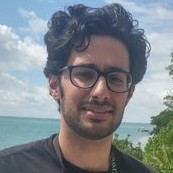From software to science

University of Miami RSMAS and NOAA EPP LMRCSC Master’s fellow, Juan Cervera had an interesting path which led him to a career in fisheries. Graduating with a bachelor’s degree in Computer Science from the University of Central Florida, Juan started a career in the software development industry, but after a few years working as a video game developer, he decided to make a career change.
“I began working with the Florida Conservation Corps and my focus began to shift,” stated Juan. “Working in the Florida state parks plant mapping and removal piqued my interest which lead to me pursing my master’s in fisheries.”
Since joining the NOAA LMRCSC, the master’s fellow has accomplished a lot, with one of his more recent accomplishments being the completion of his NOAA internship.
The NOAA Experiential Research & Training Opportunities or NERTO, for short, is an internship program, backed by NOAA, which provides students with hands on work experience in their field. In June 2020, Juan was able to work for the NOAA Southeast Fisheries Science Center in Galveston, Texas. It was there where he was assigned the task of improving the agency’s Essential Fishery Habitat Mapper technology.
“NOAA’s mapper technology is used to see if a potential construction project would overlap or interfere with an essential fishery habitat,” stated Juan. “Although the agency has this tool that is accessible by the public, it was inaccurate along the coastline. Many members of the public would call the Habitat Conservation Division to get an accurate assessment of where fishery habitats were. Although this method provided accurate information, it caused a high call volume for the organization.”
Being made aware of this issue, Juan’s software development background came in handy, for he spent this past summer working remotely for the NOAA fisheries office in Galveston, Texas to help mitigate the problem. Collaborating with NOAA scientists, Dr. Jennifer Leo and Danielle Alvarez, Juan worked on developing an application to better serve NOAA and the public.
“I was assigned with the task of creating software that would accurately depict where fishery habitats were,” said Juan. “I created a new web application that was more user friendly, which will allow for the public to have access to accurately locating fishery habitats.”
All that Juan was able to accomplish is very impressive; however, it is even more impressive that he was able to do such things working remotely. In spite of the physical distance, the NOAA LMRCSC graduate fellow was able to maintain a camaraderie with his colleagues, and build a great rapport with his NOAA mentor, Dr. Jennifer Leo.
When asked to sum up his experience, Juan has no complaints.
“Overall I had a great experience,” exclaimed the fisheries major. “Being malleable and able to adapt to change allowed for me to be successful in my opportunity.”

